Meaning of Jephthah in the Bible: A Valiant Warrior
Jephthah, a biblical figure from the Book of Judges, was the son of Gilead and a harlot, impacting his societal standing and leading to his exile. Despite early struggles, he became a formidable leader and judge of Israel, renowned for his military prowess and strategic acumen.
His story is marked by a tragic vow to God, resulting in the sacrifice of his daughter, which raises significant ethical and theological questions. Jephthah‘s narrative explores themes of redemption, sacrifice, and leadership, offering rich insights into the complexities of faith and human commitment.
Understanding these dimensions provides a deeper appreciation of his story.

Meaning of Jephthah in the Bible: Story, Name Meaning, and Spiritual Lessons
| Aspect | Details |
|---|---|
| Name Origin | Hebrew |
| Meaning | He opens / God opens |
| Biblical Reference | Judges 11–12 |
| Role in Bible | Judge of Israel, military leader |
| Key Event | Made a vow to God leading to his daughter’s sacrifice |
| Symbolism | Leadership, faith, consequences of rash vows |
| Tribe | Gileadite (from the region of Gilead) |
Jephthah’s Background

Jephthah, a prominent figure in the Book of Judges, was the son of Gilead and a harlot, which considerably influenced his early life and societal standing.
His mixed lineage and the circumstances of his birth placed him at a disadvantage within the tribal society of ancient Israel. Despite his father’s recognition, Jephthah‘s status was marred by the stigma associated with his mother’s profession.
This background shaped his identity and interactions, positioning him as an outsider within his own family and community. The complexities of his origins are critical to understanding his character and the subsequent events of his life.
Analyzing Jephthah’s background helps to contextualize the trials and leadership roles he later assumed, providing a foundational understanding of his narrative in the biblical text.
Early Life Struggles

The adversity stemming from his illegitimate birth and subsequent rejection by his half-brothers profoundly shaped Jephthah’s formative years, driving him into a life of exile and hardship.
His early life was marked by:
- Forced Exile: Expelled from his father’s house, Jephthah sought refuge in the land of Tob.
- Survival Instincts: He led a band of outlaws, honing his skills as a warrior and leader.
- Social Stigma: The constant reminder of his mother’s status as a prostitute cast a shadow over his identity.
These experiences forged his resilient character, laying the groundwork for the pivotal role he would later assume in Israel’s history.
Rise to Leadership
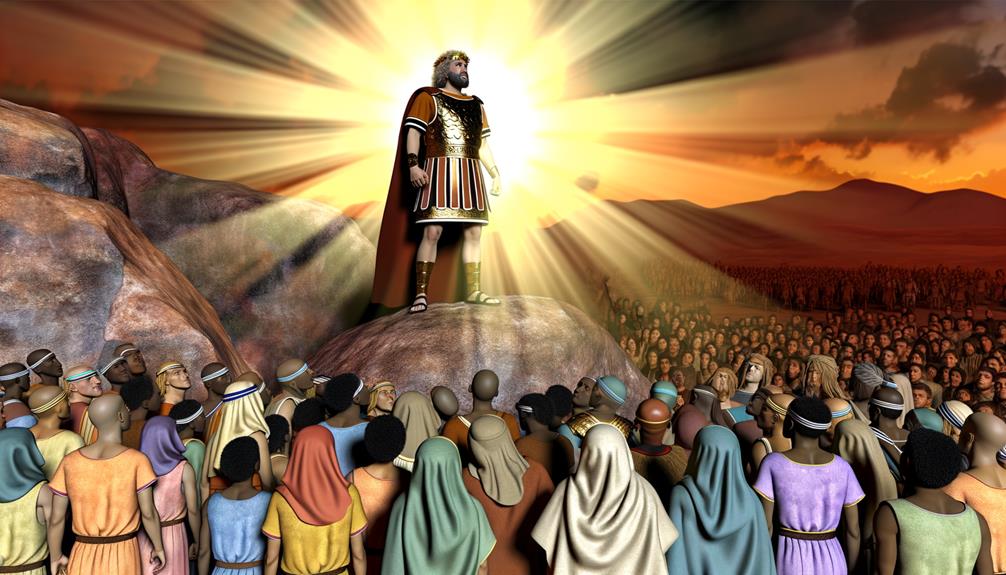
Jephthah’s rise to leadership is marked by his dramatic return from exile, a period during which he honed his formidable military skills.
His reputation as a skilled warrior prompted the elders of Gilead to seek his aid against the Ammonites, highlighting the intersection of personal capability and communal necessity.
This convergence culminates in his divine appointment, underscoring a broader theological narrative of redemption and deliverance in the biblical context.
Exile and Return
Exiled from his home due to familial strife, Jephthah’s eventual rise to leadership illustrates the complex dynamics of acceptance and rejection within ancient Israelite society.
His expulsion by his half-brothers for being the son of a prostitute underscores the rigid social hierarchies and stigmas of the time. Yet, his return was catalyzed by necessity when the Gileadites faced an existential threat from the Ammonites.
Key moments in his journey include:
- Isolation in Tob: Jephthah forms a band of outcasts, showcasing leadership potential.
- Desperate plea: The elders of Gilead seek his military prowess, reversing their earlier rejection.
- Bargaining for power: Jephthah negotiates his return, illustrating his strategic acumen.
Military Leadership Skills
Drawing upon his experiences in Tob, Jephthah’s military leadership skills were honed through leading a band of outcasts, which prepared him for the strategic and tactical demands of defending Gilead against the Ammonites.
In Tob, Jephthah developed the acumen to lead a disparate group, transforming them into a cohesive fighting force. This period of exile allowed him to cultivate essential skills such as resilience, adaptability, and strategic thinking.
His ability to navigate the complexities of leadership among marginalized individuals revealed his aptitude for command and negotiation.
Divine Appointment
The narrative of Jephthah’s ascent to leadership is deeply intertwined with notions of divine providence, as his rise from an outcast to a leader of Israel illustrates the theological belief in God’s orchestration of events and selection of leaders.
Jephthah’s story reflects the broader Biblical theme where God chooses unlikely individuals to fulfill divine purposes. This divine appointment is seen through:
- Jephthah’s exile: Initially a social pariah, he lived in the land of Tob, away from his kin.
- Call to leadership: The elders of Gilead sought him out during a crisis, acknowledging his prowess.
- Vow to God: His vow before the battle against the Ammonites signifies deep religious commitment.
The Vow to God
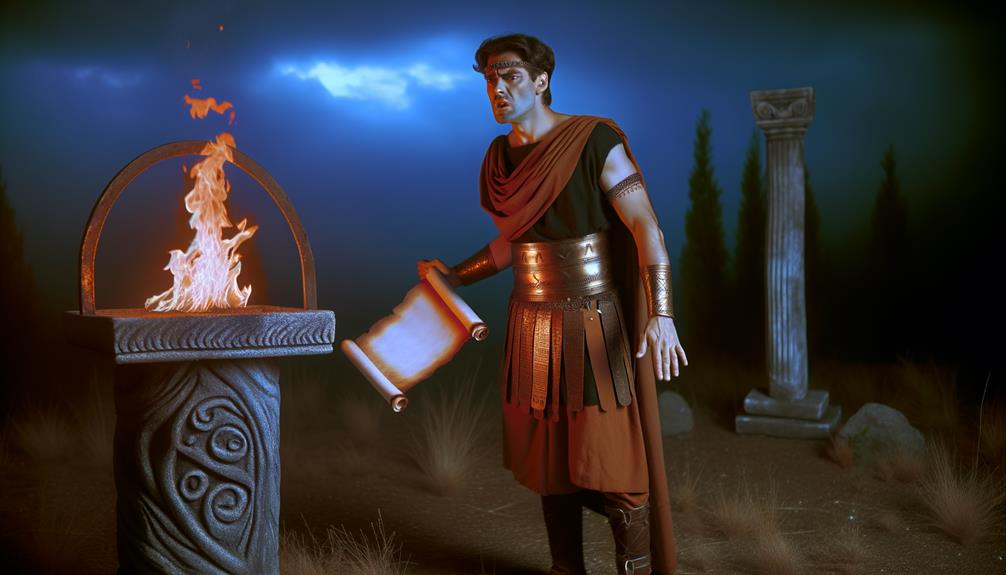
Jephthah’s vow to God, made in the heat of battle with the Ammonites, represents one of the most controversial and debated episodes in biblical literature.
Faced with the formidable challenge of defeating the Ammonites, Jephthah pledged to offer as a burnt sacrifice whatever came out of his house to greet him upon his victorious return.
This vow, found in Judges 11:30-31, raises significant theological and ethical questions. Scholars have long debated whether Jephthah’s vow was rash or an act of profound faith, and what it reveals about human-divine interactions in the narrative.
The text emphasizes the gravity of vows made to God, highlighting the severe consequences of making hasty promises.
Understanding this vow requires a nuanced consideration of ancient cultural and religious contexts.
Victory and Consequences
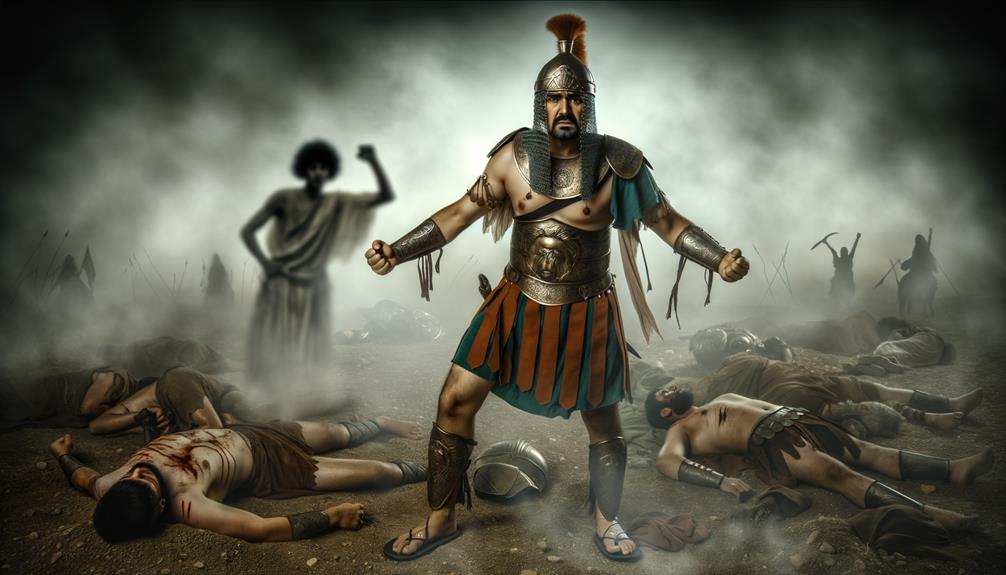
Jephthah’s military triumph over the Ammonites, while securing Israel’s territorial integrity, came at a profound personal cost due to his impulsive vow to God.
The subsequent sacrifice of his daughter, a direct consequence of this vow, underscores the severe ramifications of hasty commitments.
This narrative element not only highlights the gravity of pledges made to the divine but also invites reflection on the ethical and emotional dimensions of Jephthah’s actions.
Rash Vow’s Impact
Making a rash vow, Jephthah secured his victory over the Ammonites but consequently faced a devastating personal tragedy that has been analyzed for its moral and theological implications. His vow to sacrifice whatever emerged first from his house upon his return led to an unforeseen and tragic outcome.
Jephthah’s triumph on the battlefield is juxtaposed with his personal loss. The moral conflict of fulfilling a vow versus the ethical considerations of its consequence emerges prominently in this narrative.
Theological debates surrounding the appropriateness and necessity of vows to God have been a focal point of discussion among scholars. This story’s role illustrates the potential dangers of hasty promises.
This episode serves as a poignant reminder of the profound impacts such vows can have, prompting reflection on their wisdom and necessity.
Daughter’s Sacrifice Significance
The narrative of Jephthah’s rash vow inevitably converges on the harrowing moment when his daughter becomes the unintended victim, symbolizing the profound and often tragic consequences of impetuous commitments.
This episode underscores the duality of triumph and tragedy: Jephthah’s military victory over the Ammonites is overshadowed by the grievous personal loss that follows.
His daughter’s sacrifice highlights the peril of vows made without foresight or reflection, serving as a poignant reminder of the human cost of unbridled zeal.
Contextually, it reflects the broader biblical themes of sacrifice, obedience, and the potential destructiveness of human promises when divorced from divine guidance.
This story invites readers to contemplate the delicate balance between faith, duty, and the ethical ramifications of one’s actions.
Theological Interpretations
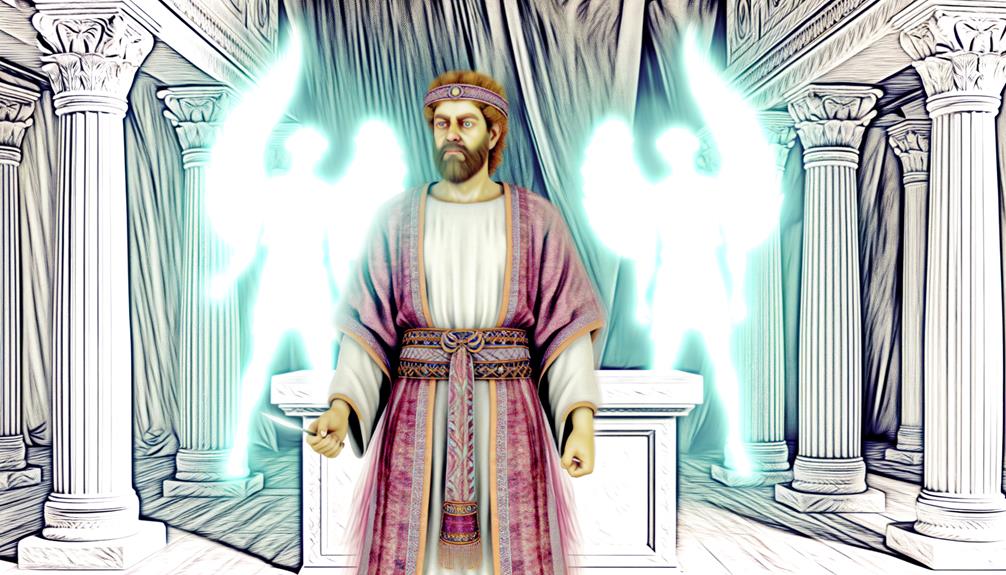
Various theological interpretations of Jephthah’s narrative in the Bible explore the complexities of his character, his vow, and the broader implications for understanding faith, sacrifice, and divine will within the context of ancient Israelite society.
Scholars analyze his story through various lenses:
- Faith and Obedience: Jephthah’s unwavering commitment to his vow reflects a profound, albeit tragic, expression of faith and obedience to God.
- Moral Dilemmas: His narrative raises ethical questions about the nature of vows and the morality of fulfilling them at any cost.
- Divine Will: The story challenges readers to reflect on the extent of divine involvement and approval in human actions.
Jephthah’s Daughter

In examining the tragic figure of Jephthah’s daughter, one must consider the narrative’s cultural, theological, and ethical dimensions to fully grasp her role and significance within the biblical text.
Her story, found in Judges 11, highlights the complexities of vow-making and the severe consequences of rash promises. Contextually, her fate underscores the patriarchal structures and the sacrificial practices prevalent in ancient Israelite society.
Theologically, her narrative invites reflections on divine justice and human responsibility. Ethically, it raises profound questions about the value of human life and the morality of fulfilling vows at exorbitant costs.
Understanding Jephthah’s daughter consequently requires a nuanced exploration of the interplay between faith, duty, and the human condition within biblical literature.
Themes of Sacrifice

The themes of sacrifice in Jephthah’s narrative are pivotal, particularly when examining the dire consequences of his vow, which ultimately led to the tragic offering of his daughter.
This incident starkly contrasts the customary practice of animal sacrifices in ancient Israel, thereby highlighting the gravity and moral complexities of human sacrifice within the biblical context.
Through this lens, Jephthah’s story underscores the profound implications of rash vows and the ethical dilemmas they engender.
Jephthah’s Vow Consequences
One of the most profound consequences of Jephthah’s vow is the stark illustration of the complexities and severe implications of vows and sacrifices in biblical narratives. His promise to offer as a burnt offering whatever first greeted him upon his victorious return led to the tragic sacrifice of his only daughter, underscoring the gravity of rash vows.
- Irrevocable Commitment: Jephthah’s vow highlights the binding nature of words once spoken.
- Familial Devastation: The personal cost to Jephthah and the loss of his lineage profoundly affect the narrative.
- Ethical Dilemmas: The story raises questions about the morality and necessity of such extreme sacrifices.
- Divine Expectation: It probes the expectations and demands perceived in one’s relationship with God.
This episode offers a sobering reflection on the weight of promises made in faith.
Human Vs. Animal Sacrifice
Throughout biblical narratives, the juxtaposition of human and animal sacrifices reveals complex theological and moral dimensions deeply embedded in ancient faith practices.
Animal sacrifices, codified in Levitical laws, were intended as atonement for sins and as acts of devotion, reflecting humanity’s relationship with the divine.
In contrast, human sacrifice, as seen in Jephthah’s tragic vow, is portrayed with ambivalence and often condemnation, underscoring a severe deviation from accepted norms. Jephthah’s story consequently serves as a cautionary tale, highlighting the dangers of rash vows and the ethical boundaries delineated by God.
This dichotomy underscores a broader biblical theme: the sanctity of human life and the evolving understanding of sacrifice within the Judeo-Christian tradition.
Faith and Leadership
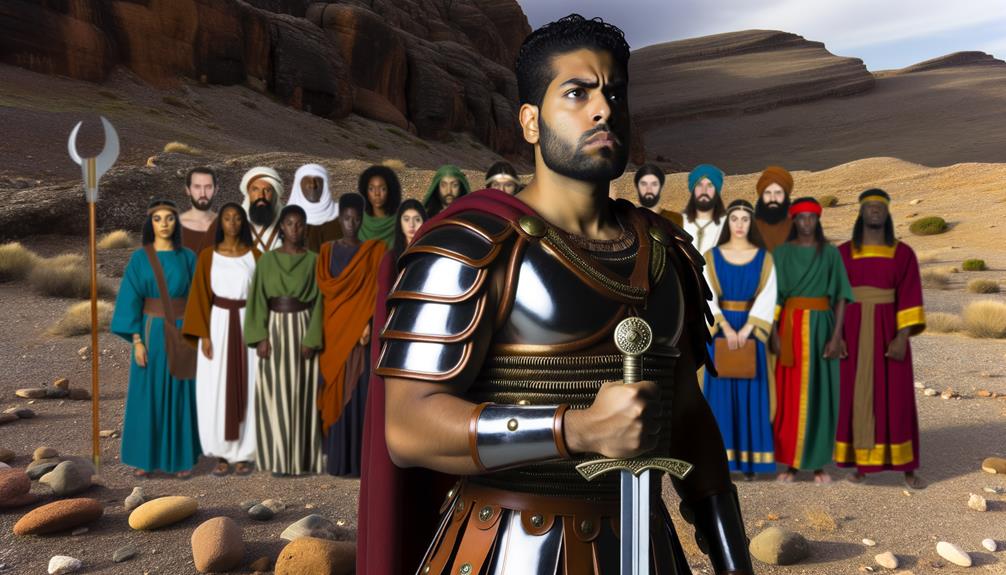
Jephthah’s story in the Bible offers a profound exploration of how faith intersects with leadership, particularly in the context of his rise from an outcast to a judge of Israel. His narrative demonstrates the complexities of faith-driven decisions and the responsibilities of leadership.
- Rejection and Redemption: Initially rejected by his own people, Jephthah’s faith and abilities eventually led to his redemption and acceptance.
- Vows and Consequences: His famous vow highlights the weight of promises made to God and their potential repercussions.
- Military Leadership: Jephthah’s strategic acumen in battle underscores the role of divine guidance in his leadership.
- Conflict Resolution: His diplomatic approach in negotiating with the Ammonites reveals a leader balancing faith with practical governance.
Through Jephthah, the Bible illustrates the nuanced relationship between personal faith and public duty.
Modern Reflections

The story of Jephthah offers valuable lessons for contemporary society, prompting reflections on how faith and leadership principles from ancient texts can inform modern ethical and governance practices.
Jephthah’s narrative highlights the perils of rash vows and the importance of thoughtful decision-making, underscoring the need for leaders to exercise wisdom and foresight.
Additionally, his experience with social ostracism and later acceptance mirrors modern struggles with identity and redemption, suggesting that inclusive leadership can yield resilience and unity.
Conclusion
Jephthah’s narrative serves as a double-edged sword within biblical literature, illustrating both the heights of faith and the depths of human cost.
His story, marked by a rise from marginalized beginnings to pivotal leadership, underscores themes of sacrifice and the complexities of vows made to God.
This tale, much like a tightly coiled spring, reveals the potential for both immense strength and tragic repercussions, inviting modern reflections on faith, leadership, and the consequences of one’s promises.






